In-between dreams of becoming an astronaut and the next James Bond, during my days of youth I also had a burning desire to be in a band. Whether I was listening to Good Charlotte, Busted, Steps, or other assorted guff that a 90’s kid such as myself grew up listening to – I wanted to play music. Unlike my other lofty ambitions as a child, this dream has always lived on in one corner of my brain, begging to be unleashed so that I may write some kick-ass jams. So imagine my joy when Guitar Hero made an appearance and turned a young, naive, 11 year old boy into a masterful (plastic) guitar player. Though real guitars obviously involved much more than five coloured buttons and a strum bar, this didn’t stop me from feeling powerful. I felt talented. I felt like a rock god. I felt like a beast, and nothing would stop me.
Fast-forward a few years and it was Rock Band’s time to shine. Building upon everything that came before it and providing the entire band experience, this was the ultimate package, and another excuse for me to indulge myself in the rockstar fantasy. Beating the drum kit like a mindless ape made me feel like a god despite my lacking talent, and busting out some silky-smooth vocals on the mic in front of hundreds of virtual crowd members felt just like the real thing – albeit without the crippling nerves. With two more core titles released over the following years, the Rock Band franchise was a huge hit not just with myself but also commercially. Iterating upon itself with each new release and peaking at the feature-packed Rock Band 3 with one hell of a solid soundtrack, the franchise grew until it hit a brick wall. Unlike the popular saying, you can in fact have too much of a good thing, and soon the popularity waned following an overstayed welcome, and an incredibly crowded market.
Fast-forward once more – 6 years later, to be exact – and the series has burst out of retirement with the release of Rock Band 4. With plenty of room to breathe these days within its own genre and a new audience to captivate, the question remains on everyone’s lips: Is Rock Band relevant enough to reclaim its former glory and start another revolution? The answer: yes, and no. Though a comeback it might be, it isn’t the victorious comeback you might have been expecting. On the scale of zero to The Mighty Ducks, Rock Band’s comeback sits somewhere in the middle, feeling far less mighty and more akin to a hotly-anticipated reunion tour that includes only half of the original members. Though there is undoubtedly fun to be had, it unfortunately feels lacking and the experience is rather disappointing.
Playing it safe and delivering on a familiar experience, Rock Band has been able to further refine an already solid gameplay experience. What we are presented with is the finest core gameplay found in any Rock Band title, and perhaps any rhythm-action title to date. Input feels incredibly responsive, instrumentation feels tighter and more accurate than ever, rhythms and riffs are enjoyable and challenging to play, and duking it out for high-scores has never felt more addictive. At its core it may well sound like the Rock Band experience you remember, but Harmonix haven’t simply settled with adding spit and polish to an already gleaming package. To their credit, they have actively tried new things to shake up the existing formulae. Though they are far from being totally game-changing, these new additions simply aim to strengthen the foundations, and for the most part they succeed.
Forming the biggest change, new ‘freestyle’ sections are, as the name suggests, opportunities for players to take control and do whatever they wish to fit with the song at hand. Whether it’s an alternative and angelic vocal passage or a shredding guitar solo, the game actively tries to make you feel more of a performer and less of a puppet, encouraging players to get creative. Though it is all undeniably gimmicky, this doesn’t discredit the fact that it’s a feature set that is genuinely enjoyable. Being given the window to change the delivery of specific vocal lines is a smart addition, especially because it allows vocalists to adapt the song around their voice/vocal range. On top of this, the game now also caters for multiple vocalists at once, with harmonies now making an appearance during tracks, and party play being made just that little bit more fun.
These updates to the vocal performances undoubtedly make a significant and positive change to the experience, but the freestyle guitar sections feel less important by comparison. That said, this doesn’t stop them from offering a mildly exciting, but cheap thrill. Though it’s hard to pull off a guitar solo that doesn’t sound like absolute garbage, the experience of jamming out notes of your own choosing is enjoyable, despite the inevitable sporadic nature that they are sure to pursue. These performances are directed to an extent by suggesting types of notes and speeds to experiment with during set windows, but these can of course be ignored, though obedient players are rewarded with a higher score. With the ability to play a mixture of low and high notes (finally giving a real purpose to the different button sets on the guitar neck), and the addition to tap out notes, play sustained notes, and even introduce a bit of feedback, there’s plenty of features to play around with that stop each solo from sounding exactly the same. For those that would much rather play the solos that are actually written in the original track, that options is still open for you and can easily be toggled by going into the options menu.
The last major feature added to Rock Band 4 is the ‘Tour Mode’, a concept that has a tonne of potential, but unfortunately misses the mark. Feeling half-baked and devoid of much creative design, there’s not much here to really keep the player coming back for more. Playing like somewhat of a ‘Choose Your Own Adventure’, players will create a band and play through their entire career, all the while making choices at several milestones along the way. These choices are supposed to significantly shape the direction and tours that the band embarks on, but none of them really carry much weight. In fact, the choices are totally binary and will either bring the player more fans/fame, or simply provide more money/gear/clothing. This wouldn’t be so much of an issue if either reward had much of a purpose, but unfortunately they don’t. The amount of fans that you have essentially means nothing outside of a being an impressive number, and the cash, gear, and instruments are only used to customise the appearance of your band members. Ultimately, these decisions make no impact on the gameplay aside from a few minor changes to your upcoming setlists, and this is a real shame.
Due to being such a hollow mode, it’s really hard to stay invested and see it through to the end. Sure, there are plenty of gigs to play and different setlists/songs to experience, and hell, there’s even some humour to be found as the band’s narrative goes on, but in all honesty I often found myself growing tired of its offerings, especially when being forced to play the same songs frequently, or ones that I didn’t particularly enjoy. There’s nothing considerable on offer here that can’t be found within the other game modes available. ‘Quickplay’ is the same as always and once again allows players to jump in and play whatever tracks they wish from the games soundtrack, while ‘Play A Show’ is a new mode that caters more for multiplayer parties. Throwing players straight onto the stage with only a few pre-selected tracks, these shows can be as long, or as short as you wish, with players voting on the next tracks to play from a pool of random selections. The music keeps flowing, the energy is maintained, and it’s a nice addition, even though it feels less than essential.
It’s sad to see that this is where the available game modes come to an end, with online play and a practice mode being omitted outright despite their inclusion in previous titles. It’s frustrating to see a sequel that is lacking in features, especially ones that were so popular amongst the community, though with an on-going development cycle that has seen new content and features being added to the title in substantial updates (for example, the tough-as-nails “brutal mode”), there’s hope that these fan-favourites will eventually make an appearance. Described as being “the Rock Band game for the current generation”, it’s disappointing to see the game in this kind of state, especially a few months after its release. Though the game is set to become bigger and better over time, this missing content certainly dampens the current experience.
Further adding to the disappointment, the soundtrack found in Rock Band 4 is surprisingly lacklustre, and can easily be considered as the weakest of the franchise thus far. Though that isn’t to discount the quality of some of the tracks, there just aren’t an awful lot of the huge, stadium fillers that you’d expect given the track record of the Rock Band games. There are also some tracks that feel out of place too, with ‘Uptown Funk’ by Mark Ronson and Bruno Mars, and ‘I Bet My Life’ by Imagine Dragons throwing in a confusing shade of pop amongst the rock and heavy metal majority. As a saving grace, Rock Band 4 does fully support all previous Rock Band tracks, meaning that you can download any DLC you might have purchased for previous titles, as well as import entire game soundtracks for an extra cost. Given how big sales were on additional content over the last 9 years, this is a huge deal to long-time fans, and incorporating these extra tracks does significantly spice up the song selection. On top of this, the game also supports all legacy Rock Band instruments too, meaning that players such as myself can rock out with their classic Rock Band gear, making the game incredibly accessible.
Verdict
6/10
So, is it finally time to dust off those instruments and make a comeback? It’s hard to say. Though the fundamental gameplay is undeniably the strongest and most fun it has ever been, the entire experience suffers from a series of missing and disappointing features, and a soundtrack that doesn’t quite impress as much as previous offerings. Though I have no doubt that this game will eventually grow into the strongest Rock Band game to date as the on-going development adds more meat to the bones, at this exact point in its lifespan I can’t help but feel disappointed. If you’re a die hard Rock Band fan who’s frothing at the mouth for more plastic action, then you’re sure to enjoy – but casual fans are better off putting this game on hold until it becomes a more enjoyable and fuller package.


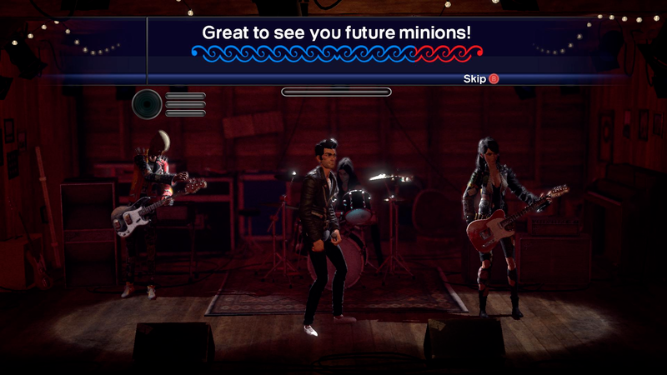
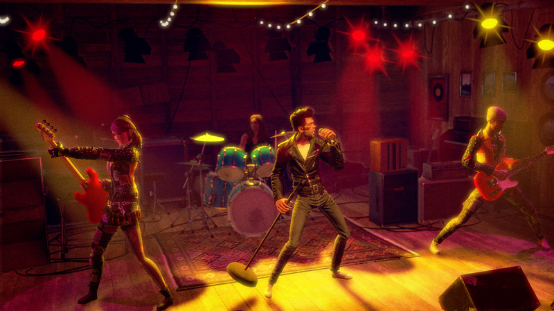
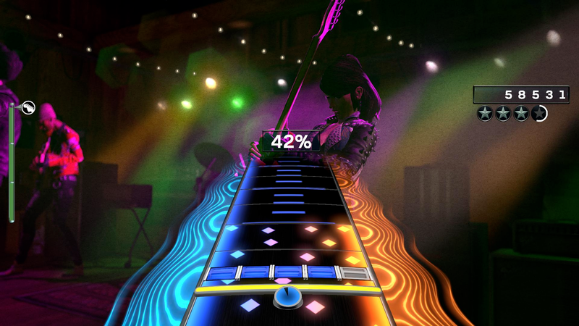
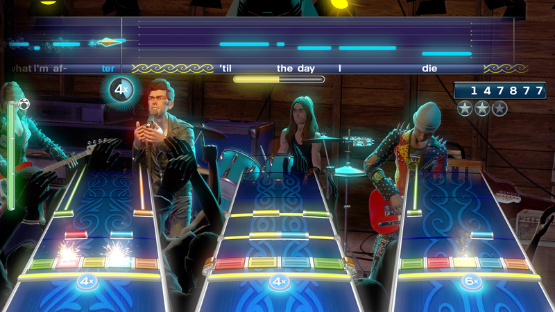

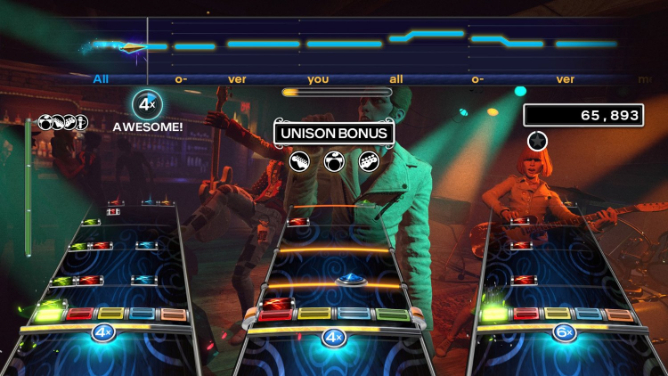
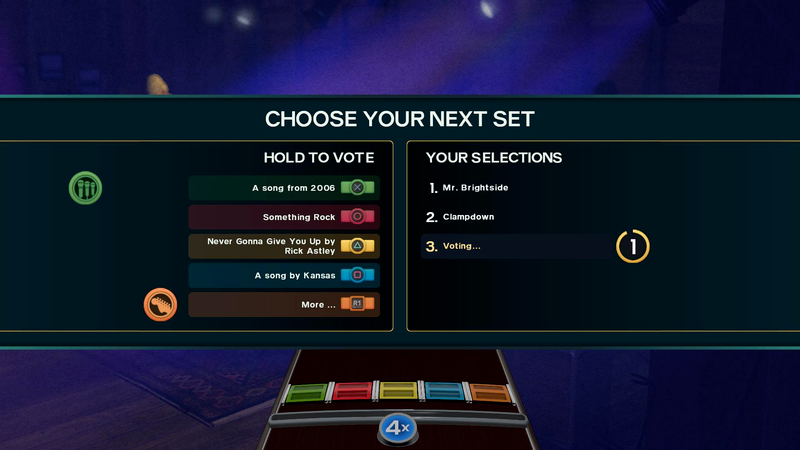

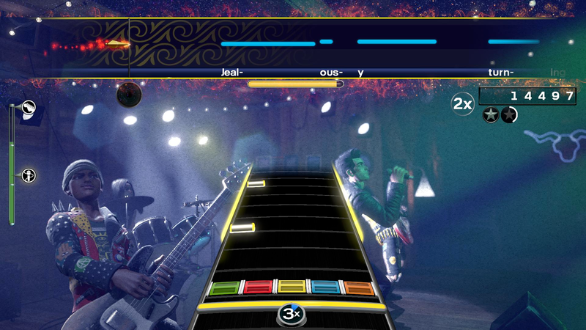








You must be logged in to post a comment.